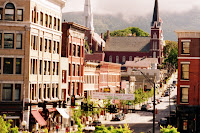Ronald Reagan was fond of quoting from John Winthrop’s seventeenth century lecture, “A Model of Christian Charity,” in which Winthrop called on the Massachusetts Bay Colony to be “as a city on a hill.” and reminded his fellow Puritans that “the eyes of all people are upon us.” But the popular symbol of America as a shining beacon of freedom for the world is a long way from Winthrop’s original concept. The city he envisioned was one in which community – not freedom – was the dominant theme.
“We must delight in each other,” Winthrop said, “make other’s conditions our own, rejoice together, mourn together, labor and suffer together.” The city on a hill was one in which people put the common good before their own desires and ambitions, “that every man might have need of others, and from hence they might be all knit more nearly together in the bonds of brotherly affection.” They were more concerned with their dependence on each other than with independence from any authority. (Yes, even including the Church of England.)

The Puritans who came to these shores in the 1630s believed they were bound in a covenant with God. If they failed to keep their end of the bargain, they should expect to be punished – not individually but as a community. “If we deal falsely with our God in this work we have undertaken,” said Winthrop, “we shall be made a story and byword through the world.” In other words, they would be a public humiliation, a scourge upon the earth. The city on a hill metaphor was intended as a warning as much as a promise. Keeping that covenant put the Puritans under specific obligations.
It required them to be charitable to each other. “There is a time when a Christian must sell all and give to the poor,” Winthrop insisted. “There is a time also when Christians (though they give not all yet) must give beyond their ability.” They were to let no one go hungry or without shelter. They had a duty to visit the sick, and to comfort those whose loved ones had died. They were supposed to watch out for each other. “Mutual watch,” they called it, and they took it very seriously.
If “mutual watch” sounds comforting, we should remember that it has a dark side. It’s the uncomfortable part of living in community. It means that if you beat your wife, you should expect to be reported to the authorities. Your absence from worship will be noticed and if you miss enough services, you will be reprimanded. If you get drunk and insult your neighbor, you’ll have to apologize for it - in public.
Anyone who’s lived in a small town has experienced this to some extent. If you grew up in a town under 2,000 people, chances are you haven’t ever quite lost that sense that everyone knows your business. And you know everyone else’s. You learn that everything you do and say will likely be recorded in someone’s memory and played back to someone else. You learn to mind what you say and what you do. You learn to take care of your reputation, because once you lose it, you can’t get it back.
The “mutual watch” was a duty, and it went way beyond sharing information. It required doing whatever was necessary to relieve the suffering of others in the community. Winthrop spoke of a “double law” that regulated all their relationships: “This law requires two things,” he said. “First, that every man afford his help to another in every want or distress. Secondly, that he perform this out of the same affection which makes him careful of his own goods.”
This understanding of each person’s responsibility for the well-being of everyone else was integral to life in the “city on the hill." Not exactly what Ronald Reagan had in mind.
In fact, the Puritans were as wary of personal freedom as we are entranced by it. Their commitment was to community. They understood its costs and its perils. They knew that community wasn’t easily accomplished; it was a difficult and often frustrating undertaking.
They also knew that freedom, unharnessed to a self-reflective humility, was a dangerous thing. It had the potential to loose the demons of greed and corruption, to elevate self-righteousness, and ultimately to destroy community itself.
America has come a long way from the Puritan dream. Few of us would want to go back to it, even if we could. But have we perhaps forgotten something life-affirming and necessary in our national journey? Does personal freedom, when taken to an extreme, have a way of isolating us? Even in crowds, we often find ourselves alone as we listen privately to music on our mp3 players or carry on cell phone conversations as we walk down the street. We often feel anonymous, just numbers on a social security or credit card. We receive phone calls from robots. We spend hours sitting alone in our cars, commuting to work and driving to shopping malls. We try to fill our need for community with characters from television shows or by joining special interest groups, or instant messaging. Yet we still feel oddly unconnected, and so we chase our dreams across the globe, but they’re never quite within our grasp.
Community makes demands on us. It is hard work – life-changing, world-changing, hard work. It intrudes on our personal space and requires us to relinquish some of our own freedom for the good of all. But it is through these sacrifices that we become part of something greater than ourselves. “Love,” claims Winthrop, “is the bond of perfection.” In this bond people “partake of each other’s strength and infirmity, joy and sorrow, weal and woe.” This is the city on a hill that Winthrop envisioned: true community, a beacon not of freedom, but of love.

















